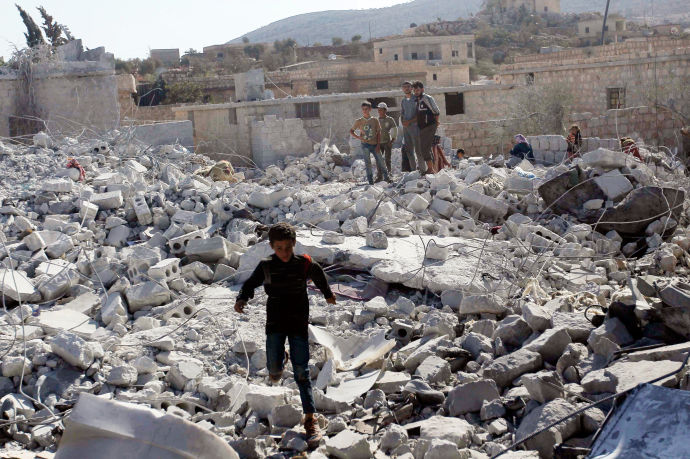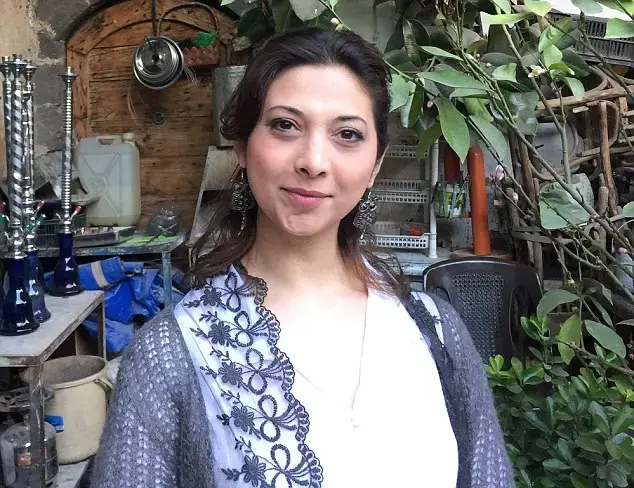"Since Cain killed Abel, war has all been about young men killing each other," a 32 year-old translator is telling me, over Arabic music and the delicate light cast by stained glass windows.
"All of us have been affected in this war, but the main purpose has been to get rid of young men."
The absence of young men in Syria is glaringly obvious to any visitor to its major cities.
In the cafés, in the markets and in the streets there are simply less of them around – and those that are are wearing badly fitting khakis, on their way or from a military billet.
"Ask the barbers," says Shukran, "and they will tell you they have lost three quarters of their business."
But at the same time, the chaos of war has allowed some women the freedom to pursue a lesbian relationship, in a country that--at least technically--bans gay relationships.
While the vast majority of the dead in the Syrian conflict so far have been young men killed fighting each other, countless others have departed as migrants before they meet the same fate.
Some are avoiding compulsory military service, others airstrikes or rebel militias; many thousands are already in Syrian government prisons.
The result is a permanent demographic hole in the Syrian population. It's women, especially those who might have wanted to get married or to have children, who've been left behind.
Shukhran is one of them. Thirty-two years old and unexpectedly single, most of her male friends and peers are either dead, in exile, or in prison – or they've fled all of the above.
While men disappear daily, the ranks of single women and widows are growing all the time. One recent poll put the numbers of unmarried Syrian women at 70%.
"It is difficult to find a, how do you say, a Mr. Right?" says Shukran. As if finding a boyfriend wasn't hard enough, a festering sectarianism has made Syria's different religions and ethnicities more loath to marry outside their own kind.
Shukran's last relationship collapsed, at least in part, because her boyfriend was a Christian and she a Druze Muslim.
"The first two years we were in paradise," she remembers. Then came the conflict and the pair ended up spending all of their time watching the grainy horrors of the war on YouTube or the evening news.
"We stopped talking to each other, or doing things together, and just turned the TV on."
It made her Christian partner see her Islam faith in a whole new light. "Look what Muslims are doing," he'd complain. "How can you be a Muslim?" They drifted apart.
Money, or the lack of it, is also a factor. The humiliating absence of gainful employment for young men kicking their heels around Syria's big cities was one of the key reasons the revolt broke out five years ago.
Now things are infinitely worse. The Syrian pound has crashed to a tenth of its value, and the average monthly wage is around fifty dollars.
In Syria's traditional culture young men need gold to get married; a single gram costs 17,000 Syrian pounds (34 dollars) and the average ring weighs 18g, so hardly anyone can afford to buy one.
Then there's the dowry money to be given directly to the family; at its very lowest it now amounts to between four and six months of a young man's annual salary.
"People, usually the families, really want this," one young woman told me. "And they might cancel a whole marriage for this, so it's really difficult for men."
Countless young Syrian men, as a consequence, have been disappointed in love. A taxi driver in Damascus--moonlighting from his university studies--explained that his own chance at marriage fell apart because of a dispute over the quality of the gold he bought his fiancé.
"There was a problem about money. Now his chief concern was the military service he'd have to do on the completion of his studies; like many he was studying, at least in part, to postpone the call up. Almost all his friends had already disappeared.
"One young man I know from Homs, who's also studying hard, was talking to a lovely woman on the Syrian coast on Facebook and Viber for many months with a view to marriage, but her father refused even to entertain the idea because he had no job. Even before they'd got around to meeting, meet, the relationship fizzled," he said.
Yara, a 23 year-old teacher, estimates that there are now four women for every one man in her circle of friends.
It's the fate of her and her unlucky peers, she bemoaned, to have been entirely airbrushed from the population.
"People like who were born in the late 1980's or early 1990's," she's concluded, "are a lost generation. Maybe they finished studying, wanted to do something with their lives--and then along came the crisis.
"Now the only dream is to travel." She misses her male friends, and just having men around the place.
She said: "Working with the same gender is difficult. You have to deal with females all around, even at work. It's monotonous."
Only three out of ten of her teaching colleagues are men, much less than there would have been before the conflict.
"There are no men anymore. It's really difficult for a woman to find a husband, a good husband. And if you do find a man, he's wearing military clothes. And even if you meet a man, you're thinking--what happens next? Will he travel, or will he do military service?"
"If he joins the army, everything is going to be difficult. Sometimes they spend a year or two without seeing their families. And if he's lucky enough to be the only child, [only male children get an exemption from compulsory military service in Syria, which sometimes make them sought after] there are no jobs."
Even the young men who are still around aren't much of a prospect. Many, reflects 35-year-old documentary-maker Ghoufran, are only teenagers, and much too young to be serious romantic prospects. "They are schoolchildren."
Lacking money and a way of getting out of the country has made many of them desperate. Others have given up on finding a relationship, she thinks, and spend too much time just talking to women on the internet.
Several young Syrian men have offered to marry her, she's convinced, with half an eye on her salary. One glamorous 30 year-old journalist I met for a quiet drink had had enough.
Young Syrian men, she complained, "are stressed, they don't have any money to bring up children…they complain all the time about work, and the military, I don't feel any stability with them."
In any case she didn't want a partner who was going to join the army; many soldiers now get only three or four days leave a month and she wasn't sure when, or whether, she'd ever see him again.
Another consequence of the conflict is that younger women have become prey to older men in their fifties and older who proposition them for affairs, sex, or a second marriage. It happened to almost all the women I met in Damascus.
"Because so many men are away in the army or dead or left the country, they think they have a chance," bemoaned Ghoufran, rolling her eyes. Sometimes it works.
"Some women say yes; women have desires, they want to be taken out. Others think they're getting older, they're still single and don't want to be alone or childless, so they accept. But the men just want to have fun, to play sex." Many of them are married. Most want "just an affair, a sexual thing," complained Shukran. "I've been tempted."
In the deeply impoverished, war-ravaged conservative Sunni Muslim areas of the country, many of which lie outside government control, the choices facing unmarried women are much more grievous than illicit relationships.
Many find themselves widows and dependent on handouts from NGOs or the UN--or on a man to remarry them. In parts of rural Syria polygamy was already common, and entirely lawful; but what was formerly a matter of cultural and religious tradition has now become an abject necessity.
"They have to, to save their families. Sometimes a man has up to four wives. The women will suffer," says Yara, who has friends in rebel areas of Northern Syria.
Many such women end up entirely dependent on NGO's or UN aid, or forced into remarrying with a much older or entirely unsuitable man.
A soldier friend of Yara's, while serving in the countryside, was offered someone's daughter in marriage for 5000 Syrian pounds (about ten dollars). "Just marry her and take care of her," said her father. "I don't have enough money to feed her."
For some middle-class women, however, the conflict has even proven a minor liberation. Yara reckons that about 10-20 percent of her female friends have come out as gay--a statistic which she attributes, at least in part, to the absence of men.
We talk about a popular bar I'd gone to the previous evening to find lesbians dancing openly on the tables; even though homosexuality is technically illegal in Syria, it's hardly ever prosecuted. "I was shocked," she confesses.
"It's not that I don't accept it. It's normal." But now girls are hitting on her more openly, and she finds the culture all too aggressive.
Even before the war, however, Ghoufran struggled to find a man who was her equal, and who wanted to treat her the same way.
Now, in addition to holding down a job and helping support her extended family, she's winning international acclaim for her short films.
"Even before the crisis here many women stay at home, or just went to an office or just wait for an opportunity to get married. I wear a veil, but I also act in plays. I have an open mind. I want to study more, to get more out of life. I'm working all the time, and tired. I want a man who loves me, who's not asking me to feed him all the time, and who understands me."
The conflict, concludes Shukran, has swept already existing dissatisfaction within Syrian society out from under the carpet.
"There is a chance to reveal what you have inside. People are not satisfied. Maybe you are not supporting me like you should be. Or satisfying me in bed."
The only thing she really misses is the prospect of motherhood--it would be impossible for a single woman to raise a child alone, even in relatively cosmopolitan Damascus.
"I want children more than I want a husband, but you have to get married to have children here."







